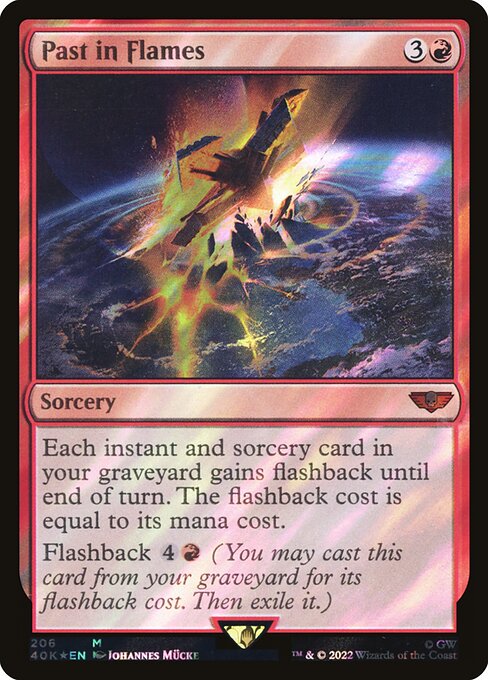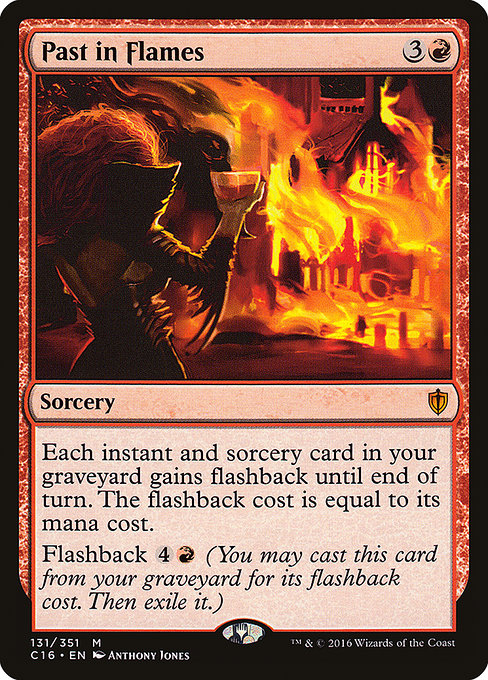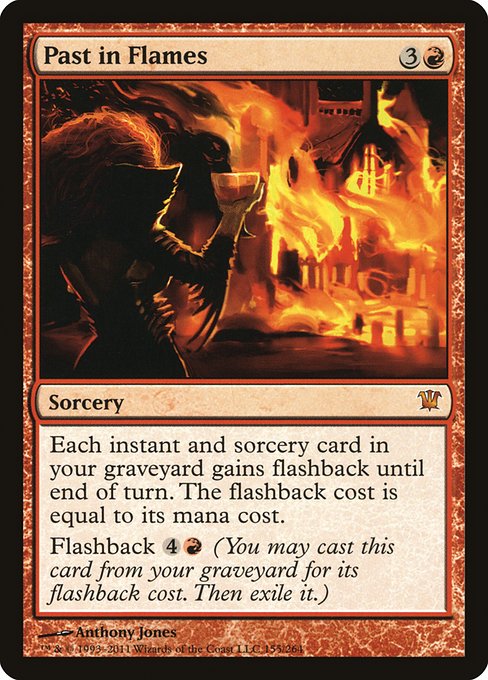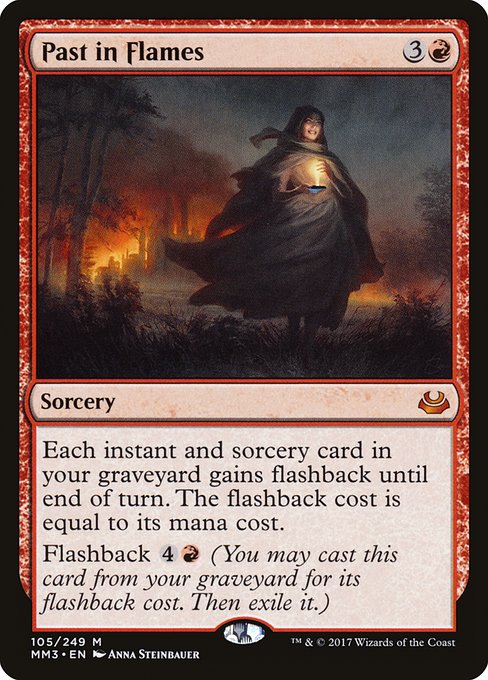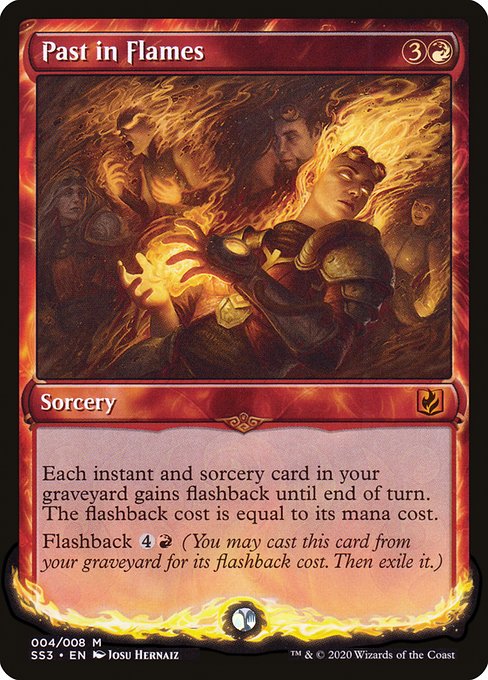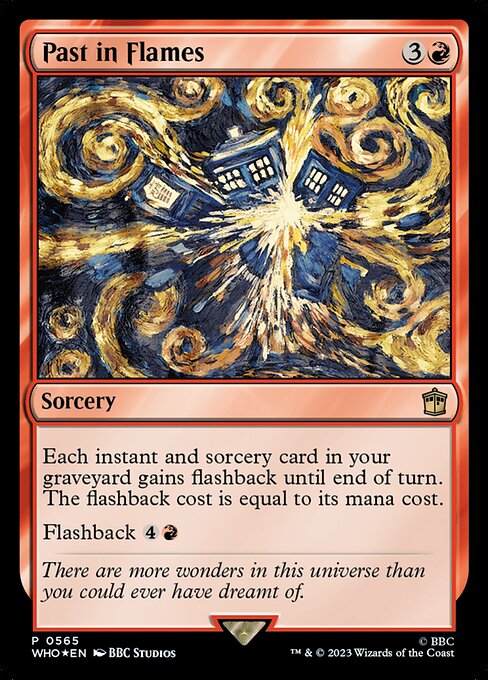standard
future
historic
gladiator
pioneer
explorer
modern
legacy
pauper
vintage
penny
commander
brawl
alchemy
paupercommander
duel
oldschool
premodern
Rulings
You must still follow any timing restrictions and permissions, including those based on the card’s type. For instance, you can cast a sorcery using flashback only when you could normally cast a sorcery.
If a split card gains flashback, you pay only the cost of the half you’re casting.
“Flashback [cost]” means “You may cast this card from your graveyard by paying [cost] rather than paying its mana cost” and “If the flashback cost was paid, exile this card instead of putting it anywhere else any time it would leave the stack.”
A spell cast using flashback will always be exiled afterward, whether it resolves, is countered, or leaves the stack in some other way.
If a card has multiple instances of flashback, you may choose any of its flashback costs to pay.
You can cast a spell using flashback even if it was somehow put into your graveyard without having been cast.
If a card with no mana cost gains flashback, it has no flashback cost. It can’t be cast this way.
If you cast an instant or sorcery with in its mana cost this way, you still choose the value of X as part of casting the spell and pay that cost.
If a card with flashback is put into your graveyard during your turn, you can cast it if it’s legal to do so before any other player can take any actions.
To determine the total cost of a spell, start with the mana cost or alternative cost (such as a flashback cost) you’re paying, add any cost increases, then apply any cost reductions. The mana value of the spell is determined only by its mana cost, no matter what the total cost to cast the spell was.
Past in Flames affects only cards in your graveyard at the time it resolves. Instant and sorcery cards put into your graveyard later in the turn won’t gain flashback.
If you cast a spell with flashback, you can’t pay any alternative costs such as overload costs. You can pay additional costs such as kicker costs. If the spell has any mandatory additional costs, you must pay those to cast the spell with flashback.
If a split card gains flashback, you pay only the cost of the half you’re casting.
“Flashback [cost]” means “You may cast this card from your graveyard by paying [cost] rather than paying its mana cost” and “If the flashback cost was paid, exile this card instead of putting it anywhere else any time it would leave the stack.”
A spell cast using flashback will always be exiled afterward, whether it resolves, is countered, or leaves the stack in some other way.
If a card has multiple instances of flashback, you may choose any of its flashback costs to pay.
You can cast a spell using flashback even if it was somehow put into your graveyard without having been cast.
If a card with no mana cost gains flashback, it has no flashback cost. It can’t be cast this way.
If you cast an instant or sorcery with in its mana cost this way, you still choose the value of X as part of casting the spell and pay that cost.
If a card with flashback is put into your graveyard during your turn, you can cast it if it’s legal to do so before any other player can take any actions.
To determine the total cost of a spell, start with the mana cost or alternative cost (such as a flashback cost) you’re paying, add any cost increases, then apply any cost reductions. The mana value of the spell is determined only by its mana cost, no matter what the total cost to cast the spell was.
Past in Flames affects only cards in your graveyard at the time it resolves. Instant and sorcery cards put into your graveyard later in the turn won’t gain flashback.
If you cast a spell with flashback, you can’t pay any alternative costs such as overload costs. You can pay additional costs such as kicker costs. If the spell has any mandatory additional costs, you must pay those to cast the spell with flashback.
Rulings
You must still follow any timing restrictions and permissions, including those based on the card’s type. For instance, you can cast a sorcery using flashback only when you could normally cast a sorcery.
If a split card gains flashback, you pay only the cost of the half you’re casting.
“Flashback [cost]” means “You may cast this card from your graveyard by paying [cost] rather than paying its mana cost” and “If the flashback cost was paid, exile this card instead of putting it anywhere else any time it would leave the stack.”
A spell cast using flashback will always be exiled afterward, whether it resolves, is countered, or leaves the stack in some other way.
If a card has multiple instances of flashback, you may choose any of its flashback costs to pay.
You can cast a spell using flashback even if it was somehow put into your graveyard without having been cast.
If a card with no mana cost gains flashback, it has no flashback cost. It can’t be cast this way.
If you cast an instant or sorcery with in its mana cost this way, you still choose the value of X as part of casting the spell and pay that cost.
If a card with flashback is put into your graveyard during your turn, you can cast it if it’s legal to do so before any other player can take any actions.
To determine the total cost of a spell, start with the mana cost or alternative cost (such as a flashback cost) you’re paying, add any cost increases, then apply any cost reductions. The mana value of the spell is determined only by its mana cost, no matter what the total cost to cast the spell was.
Past in Flames affects only cards in your graveyard at the time it resolves. Instant and sorcery cards put into your graveyard later in the turn won’t gain flashback.
If you cast a spell with flashback, you can’t pay any alternative costs such as overload costs. You can pay additional costs such as kicker costs. If the spell has any mandatory additional costs, you must pay those to cast the spell with flashback.
If a split card gains flashback, you pay only the cost of the half you’re casting.
“Flashback [cost]” means “You may cast this card from your graveyard by paying [cost] rather than paying its mana cost” and “If the flashback cost was paid, exile this card instead of putting it anywhere else any time it would leave the stack.”
A spell cast using flashback will always be exiled afterward, whether it resolves, is countered, or leaves the stack in some other way.
If a card has multiple instances of flashback, you may choose any of its flashback costs to pay.
You can cast a spell using flashback even if it was somehow put into your graveyard without having been cast.
If a card with no mana cost gains flashback, it has no flashback cost. It can’t be cast this way.
If you cast an instant or sorcery with in its mana cost this way, you still choose the value of X as part of casting the spell and pay that cost.
If a card with flashback is put into your graveyard during your turn, you can cast it if it’s legal to do so before any other player can take any actions.
To determine the total cost of a spell, start with the mana cost or alternative cost (such as a flashback cost) you’re paying, add any cost increases, then apply any cost reductions. The mana value of the spell is determined only by its mana cost, no matter what the total cost to cast the spell was.
Past in Flames affects only cards in your graveyard at the time it resolves. Instant and sorcery cards put into your graveyard later in the turn won’t gain flashback.
If you cast a spell with flashback, you can’t pay any alternative costs such as overload costs. You can pay additional costs such as kicker costs. If the spell has any mandatory additional costs, you must pay those to cast the spell with flashback.
Your collection? Your decks?
Want to manage your collection and/or create decks?
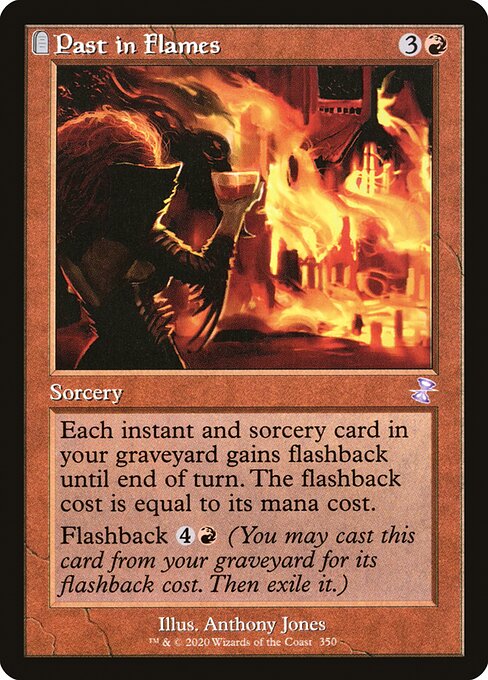

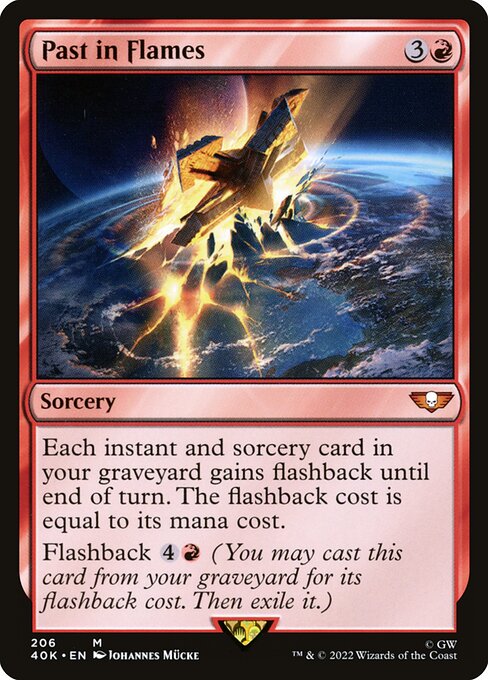
 0
0
 0.77€
0.77€
